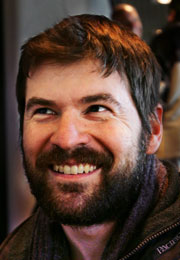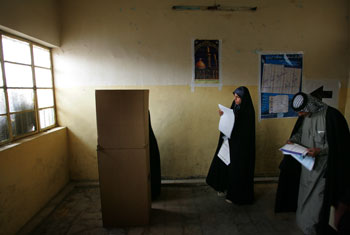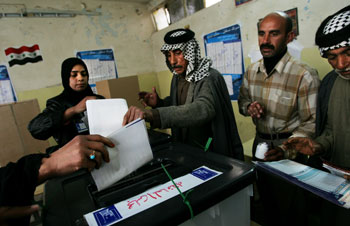 |
 | ||||||||||
Election Day
February 2005
|
 |
|||||||||
|
The night before Iraq's first election in generations, I witnessed a bona fide Pope-worthy miracle.
My lifeline to the outside world in such circumstances is my Internet satellite phone, a laptop-sized dish that allows me to send photos and get information from even the most remote assignments. I was sitting on Ahmed's couch with my sat phone plugged into the wall when suddenly I heard a pop and smelled burning fuses; the power transformer to the sat phone was crackling and emitting smoke. I cursed and unplugged it from the wall. Anyone familiar with Third World electrical grids and cranky generators knows what happened: a power surge blasted the innards of the poor thing to smoky oblivion. The sat phone itself was fine, but now was running only on its battery; I'd be able to blast out a few photos before it died but it was a huge blow. Ahmed watched all this with sorrow in his eyes. "I am very sorry," he said. "Maybe it will be better tomorrow." "No, it's toast," I said, holding the power box in my hand; it was warm and smelled of burnt plastic. "But I'll survive." The next morning we all woke with the sun, and over a groggy breakfast of fried eggs and flatbread, I spied the power block lying forlornly on the thick carpet. On a whim I plugged it in, and to my amazement its green light blinked on cheerily. It was working. "I can't believe it!" I shouted, startling the household out of its quiet morning reverie. The sight of an American clutching a plastic power box aloft and screaming at it in joy was surely one new to them. Ahmed seemed unsurprised, and he motioned up to the crumbling concrete ceiling. "God is for you today," he said, reverently. "He gave you miracle, because he wants you to show all the world what happens here today." God seems to have been for a lot of people that day: the fact that so many Iraqis turned out to vote and that the violence leveled at them wasn't much more pitched certainly seems to point to divine intervention. I wasn't expecting much trouble in Sadr City. It's a massive, monolithic slum of devout Shia Muslims, who, since they are by far the majority in Iraq, supported the election from the beginning. It's a place unkind to outsiders but it's largely been spared the jihadist car bombs and beheadings that have so terrified other parts of Baghdad. (There was all out war in Sadr City last summer, true, but that was considered a proper resistance movement of the nationalist Mahdi Army under Moqtada al Sadr against American forces; the nihilistic Islamic fundamentalist aspect wasn't involved there.) The streets were empty because the military had banned vehicle travel in the major cities and people walked in the center of the boulevards, which took on a no-school-today atmosphere. By 8 a.m., there was already a long line to get in to the local polling place, an elementary school. As we fought our way inside, a flat boom and a volley of automatic weapons fire sounded in the distance. I learned later that it was a mortar attack on a main polling site on the edge of the sprawling slum. Several people were killed.
It was an opportunity that was apparently worth the risk of death, and many Iraqis became giddy with the jubilation of it all, breaking out into spontaneous celebration in the streets around the polling stations where people waved purple-stained fingers at one another, signs that they'd voted. There was something foreign in the air that was hard to identify, but it finally came to me, amid the excited babble and the ululating of the women, which managed to relegate the occasional gunshot to mere background noise. It was hope.
In Sadr City, my trouble came from trying to get back to Baghdad before nightfall. Despite the scenes we'd witnessed all day of regular people defying the odds to reclaim their country through the mechanics of democracy, I had trouble convincing my otherwise fearless driver to brave the highway. "What's the matter? You don't think it's possible?" I asked. "I talked to my friend earlier," he said. "He is also driver. He says the roads are very closed." "But we have the driving credentials," I protested, waving what I fast realized was a worthless piece of hologrammed plastic. "Well, let me ask another driver friend," he said, calling a number on his cell phone. He had an animated conversation in Arabic. Finally he finished. "So what's the deal, can we take the road to Baghdad?" "Yes, we can," he said. "But definitely they will shoot us."
© Chris Hondros
Dispatches are brought to you by Canon. Send Canon a message of thanks. |
||||||||||
Back to February 2005 Dispatches
|
|



